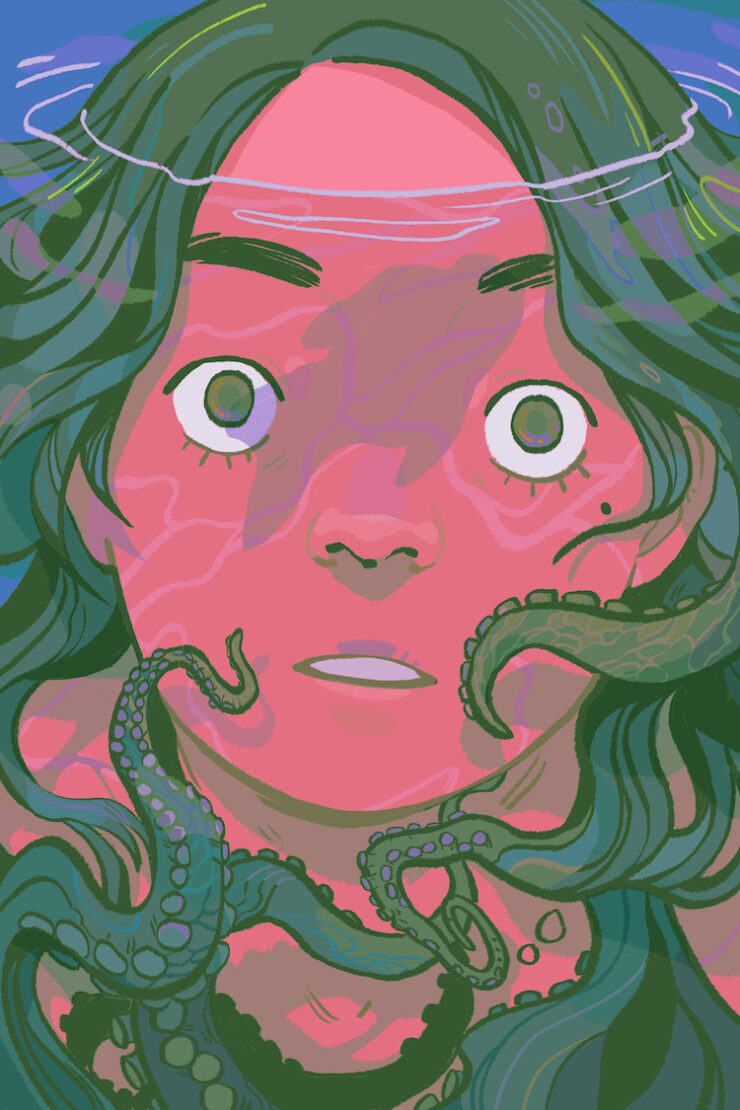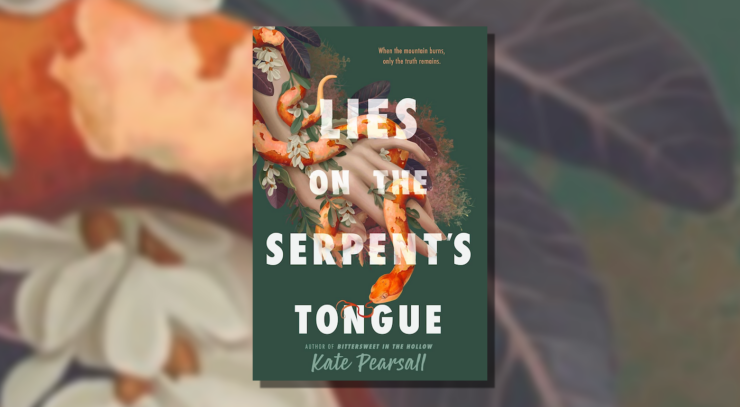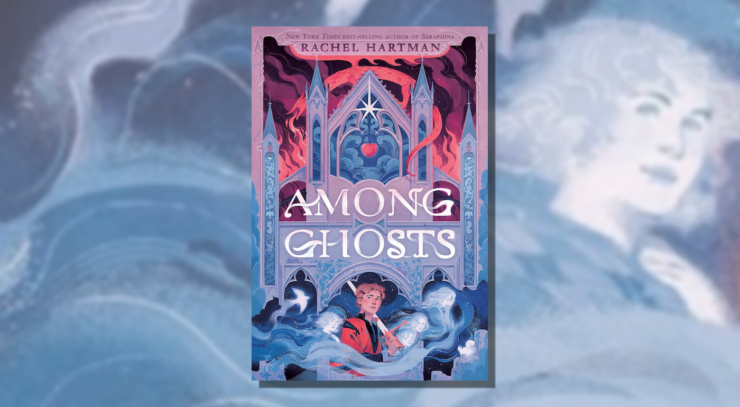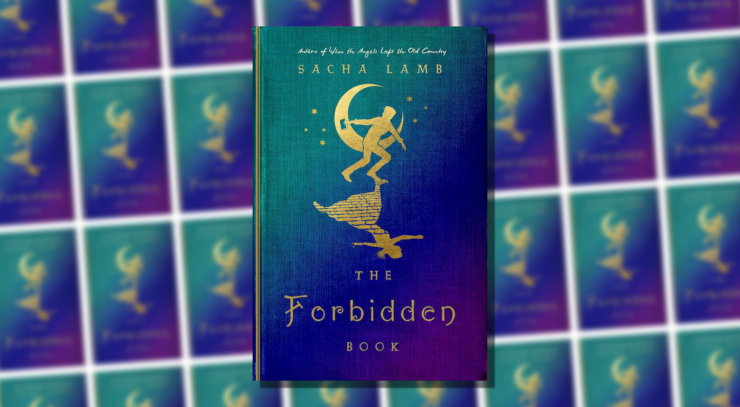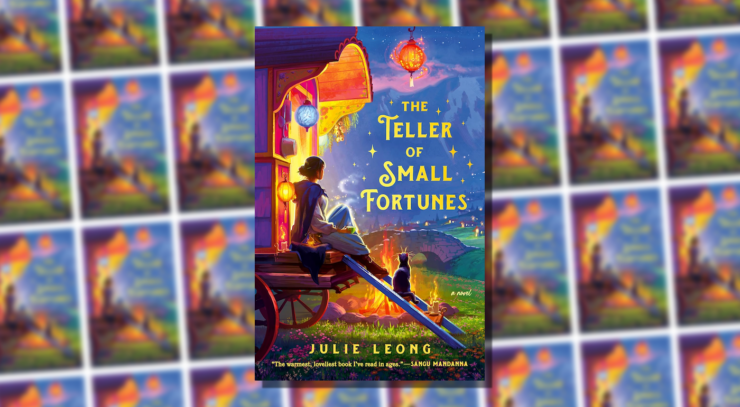While all her friends’ fish are changing into mermaids, is 12-year-old Anissa’s fish becoming something else?
Anissa touches the small round bone sprouting from the fish’s back. The fish is a small, electric blue acara, with black eyes. It’s cute but it’s only a fish. Anissa feeds pellets to the fish as it swims inside the tank in her room, and takes a closer look at the bony thing. It could be the start of a skull.
“Please be a human head,” she says to the fish. “Please, please. Even a small one would do.”
She hopes that her fish will become a mermaid. Desperately wishes it. She squints hard, pretends that she sees the outline of eye sockets, the hollow of a future nose on its surface, but it’s just wishful thinking. For now.
Gently, she takes the fish out of the tank with her small hands and puts it back in its place. Inside the bubble in her belly. The membrane around her torso softens and makes space to welcome it back. The acara fish swims fast between the walls of her belly, happy to be reunited with her. Anissa is only twelve and she knows there will be change. The acara will evolve in shape and form, turn into another species. Grow. But not turning into a mermaid would be a disaster. Everyone she knows is becoming a mermaid. Acaras are freshwater fish. They are bound by the limits of a lake or a river. They don’t swim freely in the open seas or lurk at the bottom of the ocean hidden inside bright coral reefs. It could never be happy alone in a river. She knows it.
None of her friends’ creatures are staying fishes. Most of them have developed a head, or at least a pair of shoulders and perhaps a human torso for the more mature ones. If her creature stays a fish, when she is really old and it’s time for it to be released forever—in many, many years—it will swim alone in the river. A stranger among stranger creatures whose owners she has never met before or socialized with. Mom and Dad, her grandpa, and her great aunt are merfolk too. Without family or friends, she would be cursed to loneliness for eternity.
“Please, please be a mermaid.”
Things Anissa will miss if her fish doesn’t become a mermaid:
- Her parents (and her grandpa, and her great aunt).
- Jacob, the skeleton boy.
- The taste of brine and the vastness of the ocean, the way she dreams of it every night.
- Her bike (but she can’t take that with her anyway, so what’s the point?).
- Eleni and Alex (when they are nice to her).
The membrane covering Anissa’s belly is semitransparent, like everyone’s. If a fish wants to be seen it can swim up to the membrane at the front where the belly button is. If it wants to be left alone to rest, or when it goes through a change, it can swim all the way to the back, where the spine meets the hip, or hide between the insides that lie behind the bubble.
Anissa’s fish never hides away. It constantly swims at the front of Anissa’s body as if trying to embarrass her. It never tires either. When Anissa goes to the pool the next day, wearing her bathing suit that leaves that part of her belly exposed, she can’t avoid her friends’ looks of curiosity and later their questions.
Children (mostly around her age, and some smaller ones whose mermaids have already developed a head like the bunch of show-offs that they are) examine each other constantly, comparing their progress. They peer through her membrane, Alex, Eleni, even Jacob, the skeleton boy—his merfolk still only a skeletal outline with no meat on its bones frightens the smaller children.
“What’s that thing on its back?” Jacob’s voice comes timid from under his fringe.
“Does it feel like a skull? Can I touch it?” Eleni’s fingers hover over Anissa’s bubble, like claws. Anissa takes a few steps back.
“Is it a clam?” Jacob asks, all excited.
“No, it’s a little hat!” Alex laughs.
“It’s not a hat!” Anissa protests.
Alex ignores her and waves at the smaller children who are usually impressed by his antics. “Look, everyone. Anissa’s fish is wearing a hat!”
The children flock around Anissa, shoving each other to see her hatted fish. The acara—unlike Anissa—perks up at the attention and swims frantic laps around Anissa’s bubble until her stomach is made queasy by the motion.
“Why don’t you stay hidden for once?” Anissa whines and splashes water so hard, the instructor gives her a look from the other side of the pool that makes her fish freeze.
“Cut it out.”
The instructor’s attention turns back to the older children. The teenagers. At sixteen their creatures are mostly what they will be for the rest of their lives. Graceful and beautiful mermaids. And those whose creatures aren’t mermaids have by now changed social pools or maybe stopped socializing altogether. Some people are just not compatible with each other when socializing, even if they are both saltwater creatures.
Anissa sighs. Four years at the latest. Perhaps she could be more patient if she knew that her fish would become a delicate and swift mermaid in the end, ready to take on the deepest seas. But she is not so certain this will ever happen. And she is terrified of what comes next if it does not.
Because now is the time for socializing.
Soon all the children gather in the middle of the pool, hands to their bellies. With gentle motions they take out their creatures and hold them in their hands. Eleni’s creature is the most developed one, a mermaid with lush hair the color of kelp, strong shoulders, and a lean torso. Her tail is the electric orange of the betta fish she started as. She is as big as a kitten. Eleni beams and holds her a little higher so that everyone can see, even though her face has the expression of an angry bullfrog.
“She is getting prettier, see?” Eleni says, as if guessing what the other children think.
The mermaid doesn’t speak like a human. Sea creatures communicate in other ways, but her voice is a trilling song, as angry as her face.
Alex picks up his merfolk too. It is less a merfolk and more a golden striped angelfish with long human arms. The head has taken longer than usual to appear, and the arms and part of the shoulders sprout from the sides, right behind the gills, making the fish look like it’s shrugging all the time. Which, knowing Alex, is somewhat expected.
At least Alex knows the arms belong to a human, so it is only a matter of time before the full merperson appears.
Soon, the instructor joins them, whistle in hand. She recites the rules of socializing.
“No shoving, no ignoring, and no hiding in the corals.” The last one she says looking at Jacob. “You swim together, or you don’t swim at all. You help each other progress.”
It is a good speech. Anissa thought it was inspiring when, as a nine-year-old she joined socializing for the first time. That was when her fish started to swim around her bubble instead of hovering around the bottom of her belly.
Four years.
“Let the merfolk free.”
Anissa almost loses the signal, but something swims past her, brushing against her calf and it brings her back. It is Alex’s shrugging fish, swimming not-so-gracefully. Anissa lowers her acara in the water, ready to release it.
“Hold on there,” the instructor says, one eyebrow raised.
“Did I do something wrong?”
“What is that?”
The instructor comes close and stands over Anissa and her fish. At that moment Anissa is very aware of the little bone on its head. She feels she needs to say something about it. Break the silence. Inside her grip, the acara is writhing for freedom.
She looks up at the instructor and tries to sound casual.
“The merfolk skull started to come out yesterday.”
The instructor’s face takes on a worried expression. She rests a hand on the girl’s shoulder.
“Oh, honey.” Her voice is much lower now, barely above a whisper, which makes Anissa’s belly queasy again. The other children draw a little closer to them, eager to listen. “That’s not a merfolk.”
The instructor writes something down on her notepad.
“That’s an octopus.”
Things Anissa likes about her electric blue acara:
- It’s sort of cute.
- Sometimes when she is sad, she watches it swim happily inside her bubble, its long fins flowing gently in the water, and it makes her smile.
- It’s small, so even though it moves around a lot it’s not too annoying.
- After the bone sprouted, her acara has slowed down a bit. Sometimes she even forgets it’s there.
An octopus is a thing made for the darkness of the ocean, Anissa’s mother says. It lives in the deepest deeps of the sea, hidden. Waiting to devour anything that enters its territory. Whoever has an octopus is selfish and antisocial. One of her mother’s childhood friends was an octopus. Her name is Ekaterina, and rumors say she has done much worse than be antisocial. Her mom purses her mouth shut as if she is offended by the mere memory of her unfriendliness.
Anissa doesn’t want to be antisocial. She cannot understand how someone would not want to socialize, even if it isn’t always fun. She doesn’t want to be an octopus either. She is pretty sure she isn’t. The children call Ekaterina a witch. They say she ate another creature once, a small fish.
“That’s nonsense,” Anissa says. But secretly she worries. If it turns out she is an octopus, this means she could be a witch too.
That’s why she must clear up this misunderstanding once and for all.
Her father protests at first. Anissa can’t possibly be an octopus, he says. It goes against what he has worked for all these years. Against this family’s values. When he examines her fish, the scrutiny sends chills down Anissa’s spine. But in the end, he reluctantly agrees to let Anissa visit Ekaterina. If anything, to prove the pool instructor wrong. He loves proving people wrong.
Ekaterina’s house stands at the edge of the city to the west, where the last of the townhouses with their community socializing pools abruptly stop and where the small patch of forest begins. The one that separates the city from the river. There is a small pier a few hundred meters into the forest where people take the freshwater creatures of their loved ones after they pass. Anissa has been to a couple of releases there. The water ran angry and cold, but the surroundings were peaceful, and Anissa kept wondering if the fish inside the river could see the trees.
This is a strange place for an octopus to live. Anissa half expected to be on a boat to an island, or at the very least to travel south, closer to the beach and the ocean. The house is a perfectly average townhouse save for the tallest fence she has seen. It rises around the garden as high as the windows of the second floor. None of the other houses have fences separating them. This really does feel quite antisocial.
Before Anissa has the chance to put one foot on the driveway, a curtain from a first-floor window is drawn aside and a harsh face appears. It’s one of the most angular faces Anissa has seen, with sharp check bones, a pointy chin, and a beak-like nose. Anissa remembers the kids calling Ekaterina a witch and she blames them a little less now. As soon as the door opens, the woman comes out. Ekaterina doesn’t have the fluid grace of an octopus. She is tall, and stiff, and awkward, and tall. Perhaps, Anissa thinks, Ekaterina is just nervous like she is. Or just annoyed that she has to socialize with someone. When she stands before Anissa in her full height, the girl wonders if the octopus stretches its tentacles in the space between her ankles and her ears, instead of swimming in her belly. Anissa can’t see Ekaterina’s octopus yet. A green plaid shirt, hanging loosely from her body, is tied right over her delicate hips.
“Do you like chocolate mints?”
This is the first thing the woman says. It catches Anissa by surprise.
“Yes.”
Anissa hates chocolate mints. Mint is something you clean your mouth with. Chocolate makes your teeth deliciously dirty. They are natural opposites. Anissa doesn’t like the confusion she feels when she eats them, but she wants to be accommodating.
“Good, because it’s all I have.” A smirk appears at the corners of Ekaterina’s mouth. She turns around and lets Anissa follow her inside.
While the outside looks like a normal-ish house—with the exception of that antisocial fence—the inside is more like their local library right after the smaller children have visited. There are books everywhere. The floor competes with the chairs as to who carries the greatest burden of knowledge, but it’s really the floor that’s winning. There are books in languages Anissa can’t read, but the ones that she can are all about creature biology and bodies of water.
Ekaterina clears out a couple of chairs and climbs on top of one to reach a kitchen shelf that looks to be full of books as well. Except this one hides the questionable treasure of chocolate mints inside a tin box. She passes the box to Anissa and fetches a teapot that somehow also fits on that shelf. After they have settled on their chairs, Anissa takes her time chewing half a mint, then washes it down with the black tea Ekaterina has prepared for them. Now that Anissa can see Ekaterina’s face up close, she doesn’t look so serious. There are fine lines around her eyes and mouth that make her look like she is always smiling a little. Her mother is at the same age but her fine lines don’t make her look happy.
After they finish, Anissa excuses herself and goes to the bathroom. The bathtub and the sink are also filled with books top to bottom. At least the toilet is free, Anissa thinks, even if she doesn’t plan to use it at the moment. All the time she has been here she hasn’t seen a body of water where her acara and Ekaterina’s octopus could socialize but she wears her bathing suit all the same and comes out.
A sudden dread washes over her that Ekaterina will immediately acknowledge her as one of her own. Then a second one: that she will reject her as just a fish. The small of her back grows slick with sweat as she remembers her father’s stare on her fish, but Ekaterina doesn’t look at her belly. Her gaze lingers on her cup of tea in her hand and then Anissa’s eyes.
“You’re gonna catch a cold,” she says calmly. “This room doesn’t warm up enough.”
Anissa is impatient. She is overcome with the urge to run outside and go back to her old pool. But she won’t be welcome there again. Not until she knows.
“Can you tell me if it’s an octopus?”
“Not really.”
Anissa folds in on herself but her acara doesn’t seem to share her agony. If anything, it swims on the side of her belly that’s closer to Ekaterina, which might mean it recognizes its own and that’s not what Anissa needs right now.
“Do you know if it’s going to be one?” she tries again.
The woman puts down her tea and looks at the acara for the first time. The lines around her eyes deepen and she shakes her head.
“No one knows what they are going to be until they have become it and then it’s too late. It’s too soon for me to tell. I only know you are going to be cold pretty soon.”
Anissa doesn’t move. This was such a waste of time. But then again where can she go? Is there any body of water where she is welcome?
“I need an answer so I can go back to the pool.”
“Very well then.” Ekaterina gets up and walks to the patio door that leads to the backyard.
“I can show you what an octopus looks like if you’d like that. Perhaps your fish will let us know.”
She might not be allowed back into the swimming pool, but her pool is waiting for her outside her house. Eleni, Jacob, and Alex, all three of them with curious faces. Anissa practically runs at them, as if they alone could make her forget what she saw at that house.
Of course, there are questions:
“Did you touch the octopus?”
“Did she try to eat your fish?”
“Is your fish still wearing a hat?”
Anissa takes a deep breath and tells them the story from the moment she arrived at the house until the patio door opened. Then she stops.
She doesn’t tell them about the giant pool. How Ekaterina glided through the water smoother than an eel. How—as they both stood thigh deep in the water—Anissa screamed when the long tentacles unlatched themselves from Ekaterina’s spine. Anissa can’t even figure out how she could see so far into Ekaterina’s torso. Maybe she just imagined it. But the tentacles unspooled from something behind the bubble, and they were long. Longer than Ekaterina was tall.
She doesn’t tell them that when the first tendril broke the surface of the water, she turned around, got out of the pool, and ran back inside the house. That halfway, she slipped on water, fell, and bruised her knee. But when she heard Ekaterina asking if she was all right, she got up and kept running until she was outside. Safe from those horrible tentacles.
And she doesn’t tell them she saw a tiny fish out of the corner of her eye in a tank Ekaterina kept in the backyard. That she is certain it was not just a fish, but someone’s creature that Ekaterina would devour later. That they are right, and octopuses are horrible and oh, God, she might become one of them. Why was she even complaining about being a fish in the first place?
“So, are you coming back to the pool now?” Jacob asks just before Eleni pinches his arm.
Anissa looks at her half-dry clothes.
“I think I have to wait till tomorrow.”
Eleni smirks as if she was waiting for this. “You are an octopus.”
Before Anissa can correct her, Eleni takes Jacob’s hand and pulls him away.
“We can’t be seen talking to you now.”
As they leave, with Alex trailing behind them, Jacob turns around and waves.
“See you tomorrow.”
Later, in the house, her parents call the pool manager but there is nothing to be done. She can’t go back until there’s at least a hint of what her fish will become. That’s ridiculous, her father says. He’ll call some friends and find another mermaid pool that will take her. This one will go belly up soon anyway.
But Anissa has other things on her mind. Her acara is very quiet. It only sits at the bottom of her stomach now; heavy like a small, cute pebble. Its tail is moving a little, but the eyes are not shiny anymore, and its mouth sits half-open and still.
When she tells her mother, she puts a look on her face and a hand on Anissa’s head. Sweetheart, that’s natural, she says. Anissa is not sure what the expression in her mom’s face means, but Anissa has tears in her eyes and a lump in her throat, holding down a thousand questions and no questions at all.
The next day Ekaterina’s house looks tidier somehow. The woman greets her at the door and behind her Anissa can see an empty couch and, further back, the surface of a dining table. Also there are sweets. Not the icky chocolate mint variety, but actual cookies. Chocolate chip cookies, oatmeal and raisins, and even some gingersnaps. Ekaterina extends the tin box like a peace offering.
“I haven’t had any visitors in a long time. I forgot how people react to my octopus,” Ekaterina says apologetically. “And to chocolate mints,” she adds with a brief smile.
Anissa wonders how someone can forget a reaction like the one she had yesterday. She feels a little bad about it though, so she only takes an oatmeal and raisins cookie from the box. Not a chocolate chip one. She doesn’t deserve those. Not yet.
“I was thinking we could start with something different today,” Ekaterina begins to say.
Anissa takes a large bite off her cookie. “Do you eat…fish?”
Ekaterina stops in her tracks.
Anissa swallows fast and takes a gingersnap cookie before the woman takes them away.
She doesn’t.
“Who told you I eat fish?” Ekaterina’s face is flushed now and there’s a bunch of other lines between her eyebrows that don’t look happy at all.
“I saw a fish in the yard yesterday.” Anissa looks her in the eyes. Dares her to deny it.
The woman doesn’t look stunned like Anissa expected. Only a little sad.
“That was—is Mike.”
Mike sounds like a fitting name. A tiny name for a tiny fish, Anissa thinks. She can’t even begin to guess how young the owner of the creature was. Younger than her for sure. As she thinks all that, she realizes she has followed Ekaterina to the backyard once more, tin box still in her hands. Anissa glances at the pool she was in last night and shivers a little, but they both draw near the tank.
Anissa has not seen this kind of fish before. Ekaterina calls it a harlequin rasbora. Mike is about an inch long and copper red in color with a black stripe on the side of his small body. He is a friendly little fish, already approaching the glass where Anissa has put her hand. It reminds her of her acara. Or how it used to be at least. Anissa cannot feel much movement in her belly now, but her heart’s pounding makes up for it.
“Who is Mike?” she asks. Mostly because she wants to distract herself from thinking about her acara.
“My husband’s fish. What he left behind.” Ekaterina puts her entire palm against the glass next to where Anissa’s hand is and Mike approaches swiftly.
“That’s not true,” Anissa says. She leans even closer now. That’s a small child’s creature. Why is Ekaterina lying now? She has her where she wants her.
Ekaterina’s voice becomes very cold as she asks, “How many pools have you been to, Anissa?”
“Not many,” Anissa admits. “Just the mermaid one, but Dad will soon find us another one and—”
“There are pools where you’ll see creatures you can’t believe exist. There aren’t many, but they exist. Pools with mixed bodies of water for all of us.”
Ekaterina turns around and starts for the pool. Anissa can hear her heartbeat in her ears very loudly now because she knows that she will have to look at her belly soon. She squeezes the tin box against her torso while the woman speaks.
“Mike and I were together since elementary school. He was the funny one. A happy boy. Lots of friends.” Ekaterina removes her bathrobe and stays in her swimsuit. Anissa sees nothing through the membrane this time, it’s like her whole midriff is hollow.
The octopus must be inside the pool already.
“But then we grew up. Well, the rest of us did. My fish had already sprouted tentacles by then, and I was going through my rebellious phase.” She turns to Anissa. “You are not rebellious, are you?”
Anissa shakes her head.
“Didn’t think so.” Ekaterina grins. Her legs are knee deep in the water, and something like a dog-sized ink stain paints the other side of the pool black. “Mike’s creature stayed a tiny fish and kids started cutting him off. You know how it goes.”
Anissa knows. Well, kind of. She wonders if the skeleton boy will be there tonight when she returns home.
“We stayed together until the end. That was a year ago. Rasboras are freshwater fish. Only. They are made for the soft water of forest streams and swamps. If I release him, I will never find him again. I tried to find a solution, asked so many experts. But there are no solutions.”
That’s why Ekaterina lives so close to the forest. It isn’t the river beyond that brought her here. It is the forest itself. Probably why she has all those books too.
“I am not about to eat him. But I guess I am not doing him any favors either.”
Ekaterina sits deflated at the edge of the pool. It’s the first time Anissa sees her not sitting straight. Not looking so tall. She looks more like Anissa when she can’t make up her mind. When she is unsure of something. Of everything. And Anissa is unsure a lot.
“I am sorry,” she whispers to the woman, and she means it.
Suddenly, as if she has just remembered, Ekaterina turns to the girl and says, “Let’s try this again, shall we?” She extends an arm at Anissa, like an invitation to dance. “Don’t worry, you’ll see it before it comes this time.”
Anissa’s feet stay firmly planted by the fish tank. It’s not the fear of the octopus that stops her from joining Ekaterina. Not anymore. It’s not even the fear of staying just a fish. Anissa realizes that what makes her legs refuse to take another step is the fear of not being a fish anymore.
“I can’t,” she tries to explain. “…my fish is not well.”
Ekaterina’s posture changes in an instant. She becomes the tall, composed woman again.
“Can I see?”
Anissa is terrified, but that’s why she came here. Sort of. She approaches in what seems like the slowest walk ever and, looking straight ahead, she shows her her belly. She feels nothing. The acara doesn’t stir at all. Anissa starts shaking. She imagines Ekaterina’s face full of pity or whatever her mom’s expression had been last night.
“It’s not moving,” she says. Because she needs to say something.
“Anissa.” Ekaterina’s voice is tender and comes from very far away, but only because Anissa is deep in her own thoughts. “I think I know what your fish is becoming.”
When Anissa pushes through her fear and looks down, the acara head has split in half and what comes from inside is the clear shape of a human skull.
“Oh…” Anissa’s voice breaks. “My fish is gone. I am a mermaid now.”
She puts her arms around her belly and lets the wave of grief wash over her.
“Are you? Besides, sometimes it’s okay not to name things. Not to know.”
Ekaterina stands, knee deep in the water, taller than ever, and spreads her arms, inviting Anissa inside. When the girl looks up at the woman, she only sees sorrow and kindness.
Anissa might have cried a lot. And Ekaterina’s bubble might have been strangely cushy against her face; and the octopus not so scary when it kept on its own side of the pool. She might have eaten a chocolate chip cookie too. So that was nice.
Things Anissa will miss about her electric blue acara:
- She knew exactly who she was with it.
- It was much braver than her and now she’ll have to make up for it somehow.
- That whatever Anissa might become next, it won’t be an acara. (And that she is not even sure what she is supposed to become.)
- Visiting Ekaterina. Can she still do that with her little fish gone?
- It was pretty smart as far as fish go. It probably knew it was time for a change and she should listen to it for once.
- Did the acara hurt when it let go?
When she comes home, Jacob waits there, alone, hands in his pockets. She doesn’t care so much about the others, but she asks anyway.
“They were here a minute ago,” he says, pointing somewhere between the houses.
He is a bad liar.
“I am coming to the pool tomorrow,” Anissa announces and sees his eyes open wide like Eleni’s bullfrog mermaid.
“So you’re a mermaid?”
She shrugs. “Nobody knows what they are going to be until they are it.” And when she meets Jacob’s vacant stare she says, “Maybe I am just a fish with a human skull. Do you want to scare some kids tomorrow?”
“Salt Water” copyright © 2023 by Eugenia Triantafyllou
Art copyright © 2023 by J Yang
Buy the Book
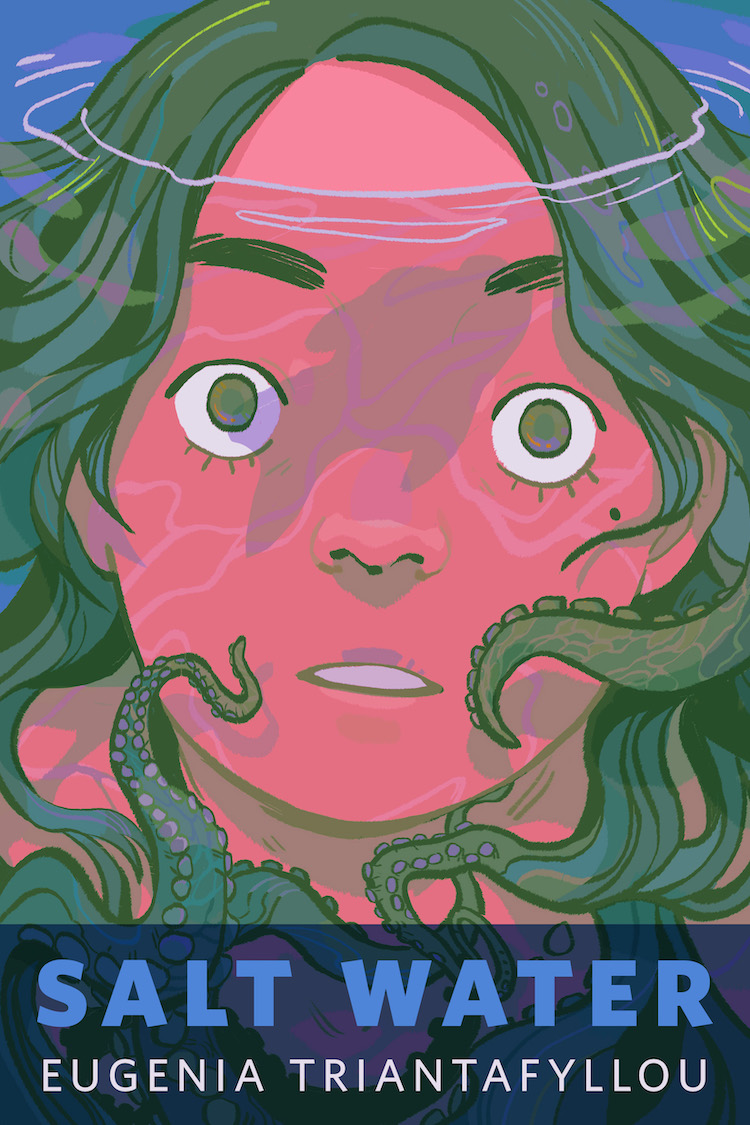

Salt Water










